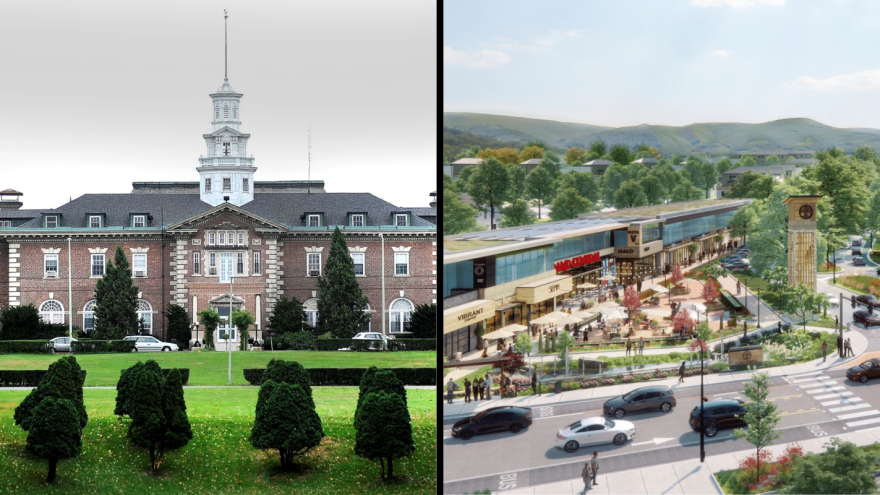ALLENTOWN, Pa. — Regardless of what happens with the old Allentown State Hospital property, environmentalists are working to protect the forested, steep slope behind it, Christopher M. Kocher said.
“It’s important from a habitat perspective,” said Kocher, president of Wildlands Conservancy, a nonprofit based in Lower Macungie Township. “It's also across the river from Walking Purchase Park on Lehigh Mountain, which is about 750 acres of protected open space that Wildlands Conservancy, Lehigh County, the city of Allentown and Salisbury Township have all worked to protect for the past 30 plus years.
“We have started the process of working with [City Center], placing the conservation easement on that steep wooded portion of the property down towards the Lehigh River.”
City Council is slated next week to vote on a package of new zoning regulations that would pave the way for the development project, dubbed “Northridge” by City Center, which acquired the property in September 2022 for about $5.5 million. While plans for the site include homes, offices, restaurants and other facilities at the 200-acre East Side property, regulations call for at least 35%, or about 70 acres, to be preserved as open space for outdoor recreation.
However, in addition to preserving the forested slope, City Center’s plans also call for additional land to be used as outdoor recreational space.
“It is our intention to enter a conservation easement with the Wildlands Conservancy to preserve the steep slope wooded areas along the north side of the Lehigh River, which is 70 acres,” said Jeff Vaughan, City Center’s director of public relations. “The additional 14 acres will have walking and biking trails as well as open athletic fields, recreation space and a center green.”
With those additional acres, green spaces would account for almost half, or 42%, of the property.
What is a conservation easement?
A conservation easement is a legal agreement by which land is held by a trust in order to ward off development. Once recorded on the property’s deed, the trust is responsible for protecting the interests of the land, preserving the area for wildlife and outdoor recreation.
“All conservation easements must provide public benefits, such as water quality, farm and ranch land preservation, scenic views, wildlife habitat, outdoor recreation, education and historic preservation.”Land Trust Alliance
“Conservation easements allow people to protect the land they love,” according to nonprofit Land Trust Alliance, a nature conservation organization. “They are the number one tool available for protecting privately owned land.
“All conservation easements must provide public benefits, such as water quality, farm and ranch land preservation, scenic views, wildlife habitat, outdoor recreation, education and historic preservation.”
As of 2020, more than 20 million acres across the U.S. are a part of state and local land trusts through conservation easements, according to the organization.
“We have about 8,000 acres under easement” in the Lehigh Valley, Kocher said. “So it's something we do quite a bit of. We've protected about 60,000 acres of open space in the region, of which 14 nature preserves are managed by Wildlands, totaling 3,000 acres.”
If approved, the easement on the former state hospital site would be held in perpetuity.
“That conservation easement would be held by Wildlands,” said Kocher. ”And we would forever ensure that the property remained protected and undeveloped.”
There are many reasons to preserve the forested slopes, Kocher said, from aesthetics to preserving the environment.
“From an environmental perspective, it's great natural habitat, it provides a buffer to the Lehigh River, it’s part of the Lehigh River Corridor,” he said. “Those forested areas along the stream end up providing significant wildlife corridors, scenic value, as well as environmental protection, environmental value as well.”
The more protected open spaces around the river, the better the river’s quality, he said.
And improving the Lehigh River is important — this year it was included in a list of endangered rivers across the country. The Lehigh, advocates argue, is threatened by “poorly planned development” of warehouses and distribution centers.
“When you're on the river and you look up, you don't realize that you're in a city, because you have this really well-defined natural corridor that exists,” Kocher said. “It's a great flyway for migratory birds and waterfowl and those types of things.

“That coupled, with the fact that there's 750 acres of protected open space right across the river, it really kind of necessitated that that area be protected in perpetuity.”
Next steps
It’s still early days for the easement process, and could take up to a year to complete.
“We're focusing really on the easement, and the language of that easement,” Kocher said. "We will, as part of our easement process, do a baseline documentation of that 70-acre wooded parcel – that'll include information about the significant natural features that are there, the habitat that's there.
“We'll also look at invasive species and recommendations to enhance the natural habitat.”
From City Center’s perspective, the next steps are to continue to work through the overall Northridge site plan, Vaughan said.
On Wednesday, the project overcame its latest hurdle, gaining approval for the new zoning regulations from the city's Community and Economic Development Committee. Four council members lauded the project’s potential.
Besides next week’s City Council meeting, there are no scheduled public meetings for residents to provide feedback on the plans.
With the goal of creating a walkable community, plans for the site show dozens of acres dedicated to recreation and woodlands.
“City Center was very interested in our guidance and our expertise when it comes to ultimately managing that natural space,” Kocher said. “But again, the first step really is to make sure that that 70-acre wooded slope is protected in perpetuity through the easement.”


